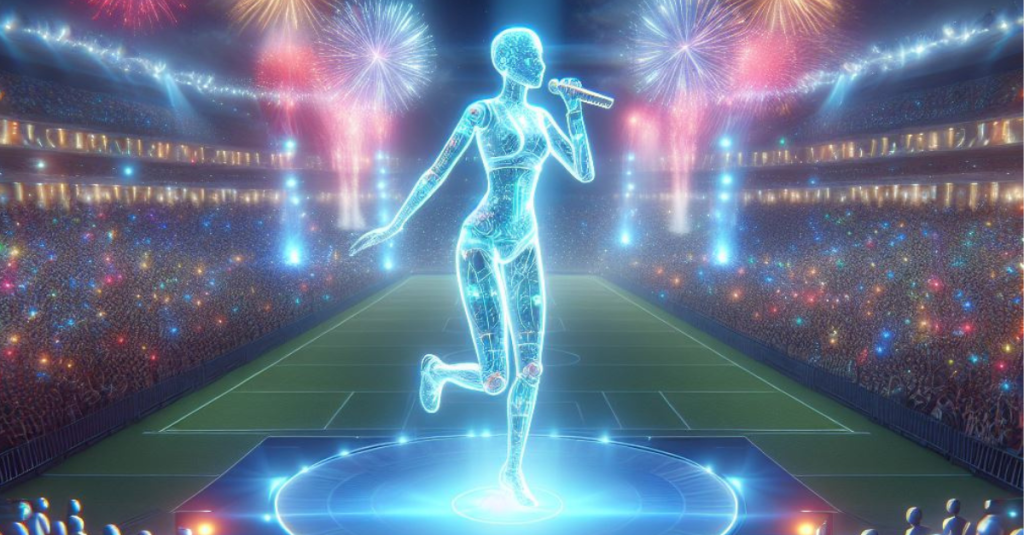What is the Future of AI in Entertainment?
Artificial intelligence (AI) is transforming the entertainment industry in many ways, from content creation to content recommendation, from audience engagement to audience analytics. AI is not only enhancing the quality and efficiency of entertainment production, but also enabling new forms of creativity and personalization. In this blog post, we will explore some of the current and future applications of AI in entertainment, and how they are reshaping the way we consume and interact with our favorite forms of entertainment.
Also Check : AI Video Art: The Future of Marketing, Storytelling, and Entertainment
AI in Content Creation
One of the most exciting and innovative uses of AI in entertainment is content creation. AI algorithms can assist or even replace human creators in generating various types of content, such as music, movies, games, and virtual reality. For example:
AI can compose original music based on different genres, styles, moods, and themes. Some examples of AI music platforms are AIVA, which creates music for films, games, and commercials, and Amper Music, which allows users to create custom music in minutes.
AI can also create movie scripts, dialogues, characters, and scenes, using natural language processing and computer vision. Some examples of AI movie platforms are Scriptbook, which analyzes movie scripts and predicts their box office performance, and Control Shift, which allows users to edit and manipulate video content using natural language commands.
AI can also design and develop video games, using reinforcement learning and generative adversarial networks. Some examples of AI game platforms are DeepMotion, which creates realistic and interactive animations for games, and Ziva Dynamics, which creates lifelike characters and creatures for games and movies.
AI can also create immersive and realistic virtual environments, using 3D modeling and rendering. Some examples of AI virtual reality platforms are NVIDIA Omniverse, which enables collaborative and simulated creation of 3D worlds, and Facebook Horizon, which is a social virtual reality platform where users can create and explore their own worlds.
AI in Content Recommendation and Personalization
Another important use of AI in entertainment is content recommendation and personalization. AI algorithms can analyze user preferences, behavior, and feedback, and suggest content that matches their interests, needs, and goals. For example:
- AI Content Recommendation:
AI can recommend movies, TV shows, music, books, and other content that users are likely to enjoy, based on their previous choices, ratings, reviews, and demographics. Some examples of AI content recommendation platforms are Netflix, YouTube, and Amazon Prime Video, which use machine learning and deep learning to provide personalized recommendations to their users.
- AI Content Personalization:
AI can also personalize content according to user preferences, behavior, and context, by adapting the content features, such as genre, style, mood, theme, pace, difficulty, and length. Some examples of AI content personalization platforms are Spotify, which creates personalized playlists and radio stations for its users, and TikTok, which tailors the content feed for each user based on their interactions and feedback.
AI in Audience Engagement and Analytics
A third use of AI in entertainment is audience engagement and analytics. AI algorithms can measure and optimize the impact and performance of entertainment content, by analyzing the audience reactions, feedback, and behavior. For example:
- AI Audience Engagement:
AI can engage the audience by creating interactive and immersive experiences, such as chatbots, voice assistants, and augmented reality. Some examples of AI audience engagement platforms are LyricFind, which provides synchronized lyrics for music streaming services, and Google Assistant, which enables users to control their smart devices and access various services using voice commands.
- AI Audience Analytics:
AI can also provide insights and predictions on the audience behavior, preferences, and trends, by using data mining and machine learning. Some examples of AI audience analytics platforms are Parrot Analytics, which measures the global demand for TV content, and Nielsen, which provides ratings and insights for media and entertainment.
Conclusion
AI is revolutionizing the entertainment industry in many ways, from content creation to content recommendation, from audience engagement to audience analytics. AI is not only enhancing the quality and efficiency of entertainment production, but also enabling new forms of creativity and personalization. As AI technologies become more advanced and accessible, we can expect to see more innovative and immersive applications of AI in entertainment, and how they will reshape the way we consume and interact with our favorite forms of entertainment.

